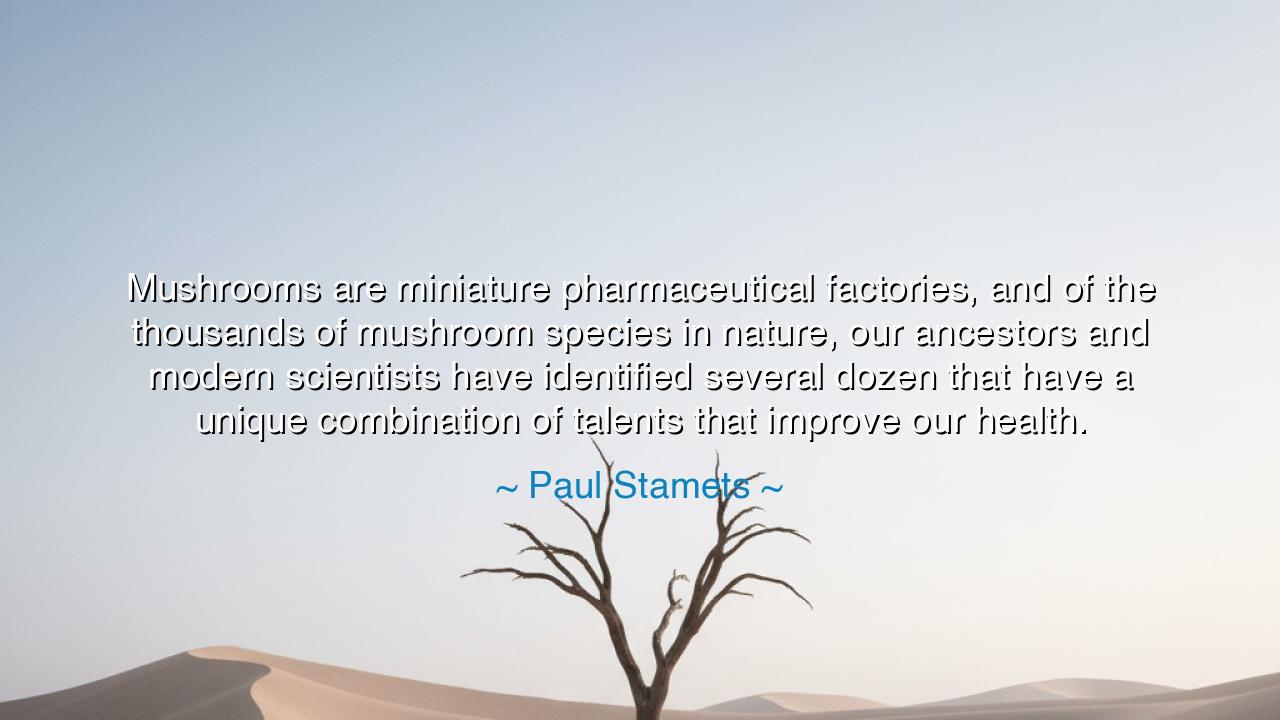
Mushrooms are miniature pharmaceutical factories, and of the
Mushrooms are miniature pharmaceutical factories, and of the thousands of mushroom species in nature, our ancestors and modern scientists have identified several dozen that have a unique combination of talents that improve our health.






In the wondrous and reverent words of Paul Stamets, we encounter a truth as ancient as the forests themselves: “Mushrooms are miniature pharmaceutical factories, and of the thousands of mushroom species in nature, our ancestors and modern scientists have identified several dozen that have a unique combination of talents that improve our health.” This is no idle statement of science; it is a hymn to the hidden wisdom of the earth. Stamets, a mycologist and explorer of the fungal world, speaks not only of medicine but of relationship — the sacred bond between humankind and the living fabric of the planet. His words awaken in us the understanding that the forest is not mute, that every tree and every mushroom whispers knowledge to those who listen.
From the dawn of civilization, the ancients revered mushrooms as both food and mystery. The Egyptians called them “the plant of immortality.” In China, sages brewed teas of Reishi and Cordyceps, believing them to bring long life and clarity of mind. The Siberian shamans consumed the red-capped Amanita muscaria in their rituals, seeing visions of worlds unseen. These early peoples understood what modern science now confirms — that within these humble organisms lies a pharmacy of nature, a collection of compounds that can heal the body, strengthen the immune system, and awaken the spirit. Stamets’ words, therefore, bridge the wisdom of the past with the discoveries of the present, showing that what our ancestors intuited through reverence, we now uncover through research.
The origin of this quote lies in Stamets’ lifelong devotion to studying fungi, born from both wonder and necessity. As a young man, he was drawn to mushrooms not only for their beauty but for their transformative power — in ecosystems and in human health. Through decades of research, he revealed that mushrooms like Lion’s Mane, Turkey Tail, and Chaga possess astonishing healing properties: enhancing brain function, fighting infections, and even aiding in cancer recovery. To him, mushrooms are not mere plants but partners — architects of life that recycle decay into renewal. When he calls them “miniature pharmaceutical factories,” he honors their complexity, for within their delicate forms, nature performs chemistry far more intricate than any human invention.
Consider the story of Alexander Fleming, who, in 1928, discovered penicillin not through machinery or ambition, but through a humble accident of nature — a simple mold growing in a forgotten petri dish. That tiny organism, kin to the fungi Stamets praises, gave rise to a revolution in medicine, saving countless lives. It is a living parable of Stamets’ insight: that the most profound gifts of healing come not from domination of nature, but from partnership with it. Fleming’s mold and Stamets’ mushrooms both remind us that in the smallest, most overlooked corners of creation, the divine intelligence of life is at work, quietly crafting cures before humanity even dreams of them.
But Stamets’ message carries a deeper resonance beyond science — it is a call to humility. In a world obsessed with control, humanity often forgets that nature itself is the greatest healer. We build laboratories and factories, yet the earth has long been its own alchemist, brewing medicine in the shade of trees and the damp of soil. The fungal networks beneath our feet — vast, unseen webs connecting forest to forest — mirror our own nervous systems, our own interconnectedness. To learn from mushrooms is to remember that healing does not come from isolation, but from connection. The health of one is the health of all: the soil, the tree, the human heart.
Stamets teaches that to heal ourselves, we must first heal our relationship with nature. The mushroom becomes both medicine and metaphor — a teacher of resilience, of cooperation, of transformation. It thrives in decay, turning death into life, rot into nourishment. So too must we, in our lives, learn to transmute hardship into wisdom, loss into growth. Just as mushrooms break down the fallen wood to feed the forest, our struggles can become the compost from which new strength arises. In this way, nature’s pharmacy is also a philosophy — a living example of regeneration and hope.
Let this then be the lesson, passed to all who seek truth: look to the small, and you will find the infinite. The cures of the body and the remedies of the soul lie not only in science, but in reverence. Walk in the forest not as a conqueror, but as a student. Observe the mushrooms that bloom from the soil, the quiet chemists of creation. Learn from them patience, humility, and renewal. As Paul Stamets reminds us, the earth is alive with intelligence — a boundless pharmacy of wisdom waiting to be rediscovered. And those who listen with both heart and mind will find that in every spore, in every cell of the natural world, there dwells the promise of healing — for ourselves, and for the world we share.






AAdministratorAdministrator
Welcome, honored guests. Please leave a comment, we will respond soon